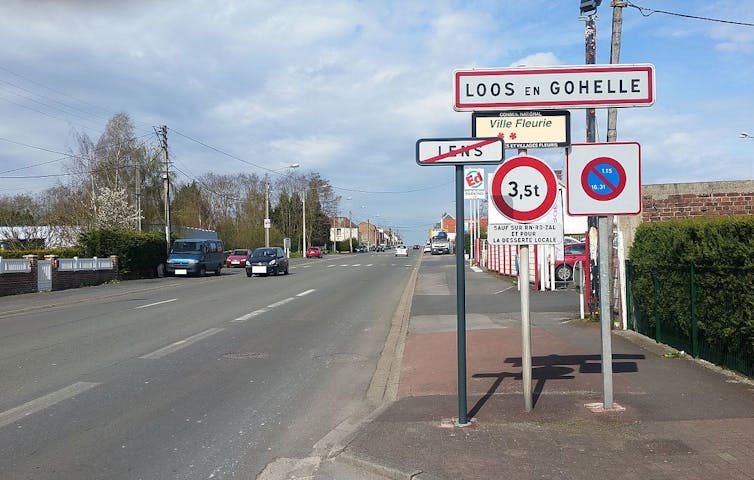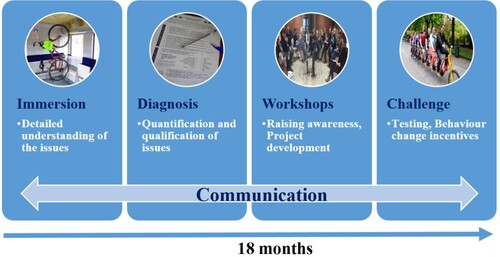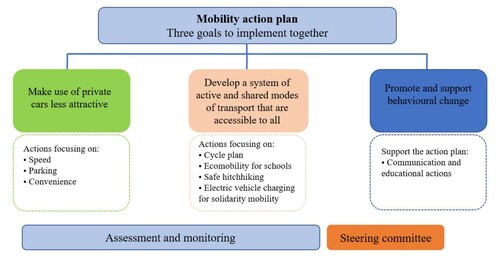How to republish
Read the original article in french and consult terms of republication.
In Loos-en-Gohelle, a “customised” sustainable mobility project created with the inhabitants
By Marielle Cuvelier, Research Engineer, Université Gustave Eiffel.

What if, in order to develop sustainable mobility and change transport habits, public authorities focused their efforts on the scale of the city and participation of the inhabitants?
This is the hypothesis we wanted to explore with researchers from Université Gustave Eiffel and in collaboration with the municipal team through an “action research” project launched in April 2017 in Loos-en-Gohelle, a suburban town in the Hauts-de-France region.
The aim of this experiment was to work alongside the local population in creating a transition toward mobility that produces fewer emissions, in order to reduce the excessive dependence of a suburban area on private cars, improve the quality of life of citizens and fight against social exclusion.
A town with a long-standing commitment
For some thirty years, Loos-en-Gohelle (Hauts-de-France) has been committed to creating a territory that meets environmental challenges. To do this, it relies on an ambitious system of participation by the inhabitants, involving them as much as possible in the projects.
This approach has produced results in the areas of housing (eco-construction and renovation), energy (production of renewable energy), food (conversion to organic farming) and, to a lesser extent, in the area of mobility within the town (bicycle lanes, walking bus and a municipal personal transport service).
Loos-en-Gohelle is both a place of experimentation in several sectors and has a great deal of expertise and experience in issues of public involvement. The project's ambition is therefore to incorporate the issue of mobility alongside the range of actions already being undertaken.
Placing the resident at the centre of the process
Designing alternatives to the use of private cars involves identifying the characteristics of the territory, questioning and understanding the travel habits of inhabitants, in order to envisage their development and the paths to be explored.
Such an approach has been implemented to understand the needs of residents and to invent new mobility solutions. The assumption being that these solutions will be better disseminated, appropriated and sustained over time by a wide audience if they are created with the inhabitants.
Along with a communication strategy, the methodology applied is based on four successive phases which took place over eighteen months and which can be summarised in four actions: immersion to understand, diagnosis to investigate, workshops to raise awareness and co-construct, and challenge to experiment.
Starting with the needs of the inhabitants
The social innovation of this project consisted in developing alternatives to private cars, based on the real needs of the inhabitants. These needs were formulated explicitly and implicitly through a survey containing some 50 questions.
This helped us to identify, quantify and qualify the conditions of mobility in Loos, travel habits according to activities, the sociology of the respondents, their difficulties and their desires in this respect.
We drew up a statistical report, but also a qualitative overview of various aspects, for example concerning attachment to the car, awareness and use of new mobility solutions (self-service bicycles, carpooling, teleworking, etc.), and the financial, practical, physical and psychological difficulties that people may encounter in their daily journeys.
It also revealed the disparities in the responses according to the different neighbourhoods of the town, reflecting social and spatial inequalities. Finally, we were able to identify obstacles and levers for changing the mobility behaviour of residents.
Creating with the inhabitants
The co-construction of solutions was initiated during participatory workshops. The method consists in creating the conditions that bring together people who are motivated by the issue of mobility, providing the tools to guarantee the participatory process and to support the stakeholders in achieving the objectives set. This process also relies on collective intelligence, drawing on the expertise of each individual.
Among the dozen or so issues identified, the workshops focused on the themes with which all the participants could identify. These topics, grouped into two main issues for the territory - developing active modes for local travel and emphasising inclusive and supportive mobility - essentially concern local everyday mobility:
- Further development of cycling, with the challenge of safe travel in the town
- Congestion and safety of walking and cycling around schools
- Exchange of mobility services to reduce the number of individual trips within an identified community
- Reducing spatial inequalities between neighbourhoods
- The digital illiteracy of many people (no access to or mastery of digital tools)
Developing low-carbon everyday mobility
Thanks to this approach, which raised the awareness of local authorities, mobility issues have been integrated into the city's ecological and social transition project for the 2020-2026 term.
A deputy in charge of mobility has been appointed and a mobility officer has even been recruited. A project concentrating on low-carbon everyday mobility is being developed with the aim of providing a systemic response (not a single solution) based on the needs expressed by the inhabitants.
The first stage of this project consists of drawing up an action plan based on three goals, to be implemented jointly: make the use of the private cars less attractive; roll out a system of active and shared modes of transport that are accessible to all; encourage and support behavioural change.
A “mobility” steering committee now brings together elected officials, employees, citizens and partners (Université Gustave Eiffel, the association Droit au Vélo, etc.) to discuss these issues. An evaluation methodology based on quantitative and qualitative indicators will be developed.
Workshop projects in development
The local authorities, supported by a research team, have already initiated studies on the projects of the future system of active and shared modes: carpooling or safe hitchhiking, a bicycle plan, school ecomobility, solutions for charging shared electric vehicles using the existing photovoltaic installations on the territory, and the development of a strategy for changing mobility behaviour.
These plans pay particular attention to ensuring that everyone has access to mobility services without necessarily using a smartphone or an Internet connection, so as not to increase inequalities.
This active research highlighted that a synergy between local authorities, inhabitants and local stakeholders which is based on a methodology, here resulting from public research, contributes positively to building a coherent approach towards more sustainable mobility.![]()
Identity card of the article
| Original Title: | A loos-en-Gohelle, une mobilité durable "sur mesure" construite avec les habitants |
| Authors : | |
| Publisher : | The Conversation France |
| Collection : | The Conversation France |
| License : | The original version of the article was published in French by The Conversation France under Creative Commons license. See the original article. An English version was created by Hancock & Hutton for Université Gustave Eiffel and was published by Reflexscience under the same license. |
| Date : | April 17, 2023 |
| Langages : | French and english |
| Keywords : | Research, cycling, mobility, citizens, bike paths, sustainable transport, municipalities, urban mobility |



![[Translate to English:] Licence creative commons BY-SA 4.0 [Translate to English:] Licence creative commons BY-SA 4.0](https://reflexscience.univ-gustave-eiffel.fr/fileadmin/ReflexScience/Accueil/Logos/CCbySA.png)